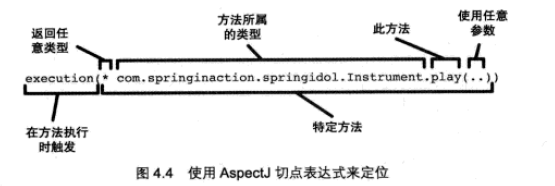上一篇介绍了一些概念,这篇我们开始进行编写代码。
1、编写切点:

如图所示的切点表达式表示当Instrument的play()方法执行时会触发通知。方法表达式以*号开始,标识了我们不关心方法返回值的类型。然后,我们指定了全限定类名和方法名。对于参数列表,我们使用(..)标识切点选择任意的play()方法,无论该方法的入参是什么。当我们需要配置切点仅匹配com.springinaction.springidol包,可以使用within()指示器来限制匹配。
除此之外,spring 2.5还引入一个新的bean()指示器,该指示器允许我们在切点表达式中使用Bean的ID来标识Bean。bean()使用Bean Id或者Bean名称作为参数来限制切点只匹配特定的Bean:
例1:execution(* com.springinaction.springidol.Instrument.play()) and bean(eddie)
例2:execution(* com.springinaction.springidol.Instrument.play()) and !bean(eddie)
| AOP匹配元素 | 描述 |
| <aop:advisor> | 定义AOP通知器 |
| <aop:after> | 定义AOP后置通知(不管被通知的方法是否执行成功) |
| <aop:after-returning> | 定义AOP after-returning通知 |
| <aop:after-throwing> | 定义after-throwing通知 |
| <aop:after-around> | 定义AOP环绕通知 |
| <aop:aspectj-autoproxy> | 启用@AspectJ注解驱动的切面 |
| <aop:aspect> | 定义切面 |
| <aop:before> | 定义AOP前置通知 |
| <aop:config> | 顶层的AOP配置元素,大多数的<aop:*>元素必须包含在<aop:config>元素内 |
| <aop:declare-parents> | 为被通知的对象引入额外的接口,并透明地实现 |
| <aop:pointcut> | 定义切点 |
样例:
pom.xml文件:
<project xmlns="http://maven.apache.org/POM/4.0.0" xmlns:xsi="http://www.w3.org/2001/XMLSchema-instance" xsi:schemaLocation="http://maven.apache.org/POM/4.0.0 http://maven.apache.org/xsd/maven-4.0.0.xsd"> <modelVersion>4.0.0</modelVersion> <groupId>spring</groupId> <artifactId>study.spring.aop</artifactId> <version>0.0.1-SNAPSHOT</version> <packaging>jar</packaging> <name>study.spring.aop</name> <url>http://maven.apache.org</url> <properties> <project.build.sourceEncoding>UTF-8</project.build.sourceEncoding> </properties> <dependencies> <dependency> <groupId>junit</groupId> <artifactId>junit</artifactId> <version>3.8.1</version> <scope>test</scope> </dependency> <dependency> <groupId>org.springframework</groupId> <artifactId>spring-context</artifactId> <version>3.1.4.RELEASE</version> </dependency> <dependency> <groupId>org.springframework</groupId> <artifactId>spring-aop</artifactId> <version>3.1.4.RELEASE</version> </dependency> <dependency> <groupId>cglib</groupId> <artifactId>cglib-nodep</artifactId> <version>2.2</version> </dependency> <dependency> <groupId>org.aspectj</groupId> <artifactId>aspectjweaver</artifactId> <version>1.6.11</version> </dependency> </dependencies> </project>
spring.xml文件:
<?xml version="1.0" encoding="UTF-8" ?> <beans xmlns="http://www.springframework.org/schema/beans" xmlns:xsi="http://www.w3.org/2001/XMLSchema-instance" xmlns:aop="http://www.springframework.org/schema/aop" xsi:schemaLocation="http://www.springframework.org/schema/beans http://www.springframework.org/schema/beans/spring-beans-3.0.xsd http://www.springframework.org/schema/aop http://www.springframework.org/schema/aop/spring-aop-3.0.xsd"> <bean id = "audience" class="spring.study.spring.aop.Audience" /> <bean id = "player" class = "spring.study.spring.aop.Player" /> <aop:config> <aop:aspect ref = "audience"> <aop:before pointcut = "execution(* spring.study.spring.aop.Player.song(..))" method = "taskSeats" /> <aop:before pointcut = "execution(* spring.study.spring.aop.Player.song(..))" method = "turnOffCellPhones"/> <aop:after-returning pointcut = "execution(* spring.study.spring.aop.Player.song(..))" method = "applaud" /> <aop:after-throwing pointcut = "execution(* spring.study.spring.aop.Player.song(..))" method = "demandRefund"/> </aop:aspect> </aop:config> </beans>
java类:
package spring.study.spring.aop; public class Audience { public void taskSeats(){ System.out.println("the audience is taking their seats"); } public void turnOffCellPhones(){ System.out.println("the audience is turning off their cellphones"); } public void applaud(){ System.out.println("clap clap clap"); } public void demandRefund(){ System.out.println("boo! we want our money back!"); } }
package spring.study.spring.aop; public class Player { public void song(){ System.out.println("la la la la la la"); } }
package spring.study.spring.aop; import org.springframework.context.ApplicationContext; import org.springframework.context.annotation.AnnotationConfigApplicationContext; import org.springframework.context.support.ClassPathXmlApplicationContext; /** * Hello world! * */ public class App { public static void main( String[] args ) { System.out.println( "Hello World!" ); ApplicationContext ctx = new ClassPathXmlApplicationContext("spring.xml"); Player p = (Player)ctx.getBean("player"); p.song(); } }
执行结果:
the audience is taking their seats
the audience is turning off their cellphones
la la la la la la
clap clap clap
ps:上述的切点每次都定义,太麻烦了,可以先定义一个切点,然后引用这个切点即可
<aop:config> <aop:aspect ref = "audience"> <aop:pointcut expression="execution(* spring.study.spring.aop.Player.song(..))" id="song"/> <aop:before method="taskSeats" pointcut-ref="song"/> <aop:before method="turnOffCellPhones" pointcut-ref="song"/> <aop:after-returning method="applaud" pointcut-ref="song"/> <aop:after-throwing method="demandRefund" pointcut-ref="song"/> </aop:aspect> </aop:config>